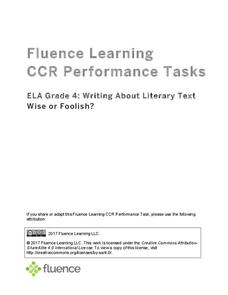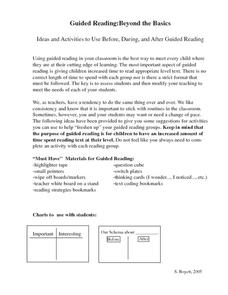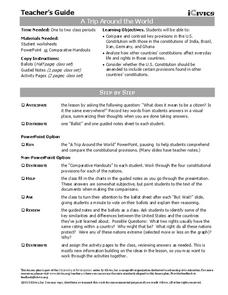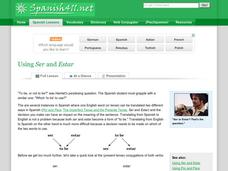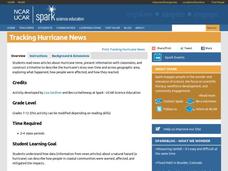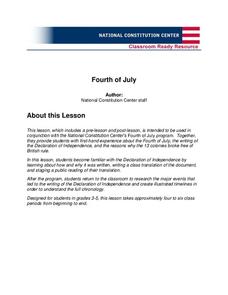Santiago Canyon College
Taking Notes for Science Class
Provide young scholars with the tools they need to succeed with this reference on the Cornell note-taking strategy. By breaking the content of lessons into main ideas, supporting details, and overall summaries, students are able to...
University of Tennessee
Note-Taking Skills (Cornell)
Taking good notes is key to success in academic classes. How to take good notes is the focus of this five-page packet that introduces the Cornell, the Five R's, and the SQ3R methods of note taking in one study skills lesson.
EngageNY
Mid-Unit 3 Assessment: On-Demand Note-Taking about Howler Monkeys
Get the facts straight. Scholars complete their mid-unit assessment by reading a text, watching a video, and observing a picture about howler monkeys. They take notes about the facts they discover to use in future lessons.
EngageNY
Analyzing Text Structure & Summarizing Text: “Equal Rights for Women” by Shirley Chisholm
Let me check my schedule! Scholars set up discussion appointments with five classmates to discuss Shirley Chisholm's speech "Equal Rights for Women." Readers then use their Note Catcher guides to analyze the text of the speech more...
K12 Reader
Summarize It!
A key reading comprehension skill is the ability to summarize. Here's a worksheet that not only explains how to summarize, but also explains why summarizing is important.
EngageNY
Mid-Unit 3 Assessment, Part II: Organizing Notes for a Public Speech
It's all a matter of opinion! Pupils take Part II of the mid-unit assessment, in which they continue organizing their notes in preparation for writing an opinion speech. Using the resource, they add reasons, evidence, and a concluding...
EngageNY
Close Reading and Summarizing: The Epilogue of Pygmalion
Moving from what to why. After completing questions over the epilogue of Pygmalion, scholars take a close look at their Eliza Character Trackers and complete part II. They have collected a lot of details about Eliza's character and now...
Read Write Think
Book Report Alternative: Rewind the Plot!
Have you ever looked for a new way to teach an old concept? Scholars thinking about the rising action of a story in a whole new perspective. However, Book Report Alternative: Rewind the Plot! challenges readers and allows for much...
EngageNY
Conducting Research: Asking and Answering our Questions about Rainforest Arthropods
Let's ask an expert. Scholars divide into groups to research and become experts on either ants or butterflies. Learners use task cards and text on their topic to complete a note catcher. At the end, they share their information with a...
Fluence Learning
Writing About Literary Text: Wise or Foolish?
A three-part assessment promotes reading comprehension skills. Class members read literary texts and take notes to discuss their findings, answer comprehension questions, write summaries, and complete charts.
Ideas From Suzi
Guided Reading: Beyond the Basics
Elevate children's reading comprehension skills with this collection of guided reading resources. From paper dice with basic comprehension questions printed on them to a system for using sticky notes to identify key parts of a story,...
iCivics
A Trip Around the World
How do the rights of citizens in other countries, such as India, Germany, Brazil, and Iran, compare to those of Americans? Take a closer look at the provisions of various foreign constitutions, and compare and contrast the protections...
EngageNY
Analyzing Point of View: Inferring about the Impact of Hurricane Katrina on People Living in New Orlean
What, where, how? Readers hone their analysis skills as they determine the narrator's point of view in Eight Days. They complete a literary analysis chart and essay to describe what and where events take place. Individuals then discuss...
State Bar of Texas
Gibbons v. Ogden
Have you ever played the game Monopoly? Do you know what it takes to win the game correctly? Scholars research the nature of outlawing monopolies in the United States while controlling trade. They investigate the court case Gibbons v....
Curated OER
Using Ser and Estar
While ser and estar both mean to be, they are each used in different situations. This is often confusing for Spanish language learners. Clarify these verbs for your class with direct instruction. The information included on this page...
Center Science Education
Tracking Hurricane News
Here is a unique twist for your lesson on hurricanes. After examining extreme weather news headlines, your storm chasers view a PowerPoint about hurricanes and then zoom in on Hurricane Irene. They map a timeline of her trek up the East...
National Constitution Center
Fourth of July (Grades 3-5)
Bring history to life for your young scholars with a Fourth of July lesson series. After a class reading of the Declaration of Independence, students translate this pivotal document into layman's terms before working in small groups to...
EngageNY
Mid Unit 2 Assessment: Text to Film and Perspective Comparison of to Kill a Mockingbird (Chapter 18 and One Scene from Chapter 19)
Have you ever heard someone say the movie is not like the book? Scholars complete a mid-unit assessment to compare scenes from the novel To Kill a Mockingbird to the movie version. The assessment contains short answers, multiple choice,...
EngageNY
Structuring The Search: Categorizing Our Research
What can you contribute? Scholars read text to determine how ants contribute to the rainforest. First, they categorize and sort facts gathered from reading. Next, readers focus on specific terms in each paragraphs of the text Ants by...
Curated OER
The Global Precipitation Measurement Mission (GPM) Lesson
Introduce your class to one of the ways that technology is benefiting humanity. The Global Precipitation Measurement Mission involves the data collected by nine satellites from different countries with a united focus on studying world...
Curated OER
Conjugating Verbs in Spanish
It's time to conjugate! If your class doesn't really know what that means, use the materials provided here to build understanding. The resource covers verbs, infinitives, the different Spanish verb endings, conjugation in the present...
Cornell University
Fibers, Dyes, and the Environment
Nanofibers can be made through electrospinning or force spinning in order to reduce the negative impact on the environment. Pupils study the role of fibers and dye on the environment through a series of five hands-on activities. Then,...
Curated OER
The Present & Imperfect Progressive
Starting off with present participles, this resource tackles the progressive with grammatical explanations, examples in English and Spanish, and an interactive practice exercise. Use the menu at the top of the webpage to navigate to each...
Newseum
Evidence: Do the Facts Hold Up?
Sometimes it's hard to escape bad information! Pupils learn the E.S.C.A.P.E. method for evaluating news sources and complete a worksheet to assess a news article using their new skills.











